آسيا والمحيط الهادئ
توفر شبكة CALP الدعم التنسيقي والتقني ولسياساتي للمنظمات التي تنفذ أو تفكر في تنفيذ برامج المساعدات النقدية والقسائم في منطقة آسيا والمحيط الهادئ. يقع المكتب الإقليمي لشبكة CALP في منظمة العمل ضد الجوع في مانيلا، الفلبين.
تواصلوا مع الفريق
Featured content

Impossible Choices – questioning assumptions behind lock-down in low income and fragile contexts
Blog Post
“The COVID-19 pandemic will have devastating consequences on people’s livelihoods and employment, especially in post-fragile, crisis and post-crisis environments.” Global Humanitarian Response Plan: COVID-19 Over the last few weeks we’ve seen significant discussion on the CALP Network d-groups and elsewhere on what the COVID pandemic means for cash and voucher assistance (CVA). The...

CVA in COVID-19 Contexts: Guidance from the CALP Network
Guidelines and Tools
This is a summary of the key points from the many resources you shared on CVA and COVID through this document. This is a living document and we will continue to update this summary as new resources are added. The below is intended to help organisations understand and prepare for likely impacts of COVID-19 on their work, consider whether CVA is right for the contexts in which they operate and...

The CALP Network-Asia Pacific Regional Cash Working Group learning event report
Report
On 20-22 May, 27 cash working group (CWG) coordinators and regional technical focal points convened from Afghanistan, Fiji, Indonesia, Laos, Myanmar, Nepal, Pakistan, the Pacific region, the Philippines and Vietnam to share experiences and strengthen coordination between country, regional and global levels. The objectives of the event were to: 1) Share experiences and identify solutions around...
All Asia and Pacific content
نتائج 141 من 160 – 295
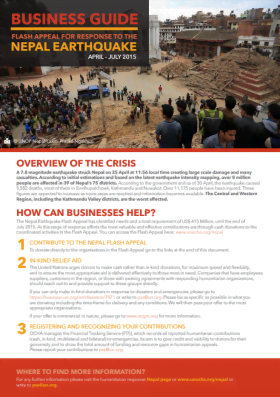
Business Guide – Flash appeal for response to the Nepal earthquake
Policy paper
An overview of the main humanitarian issues facing Nepal following the 2015 Earthquake, as well as indicators as to how businesses can assist with disaster response.
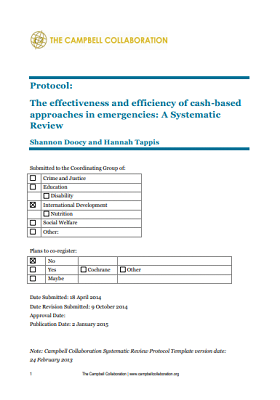
The Effectiveness and Efficiency of Cash-Based Approaches in Emergencies: A Systematic Review
Report
To access a document detailing the background, literature review, and objectives related to this review, please click here. Cash-based approaches have been used for development purposes for a number of decades, particularly within social protection interventions in low- and middle-income countries. Over...
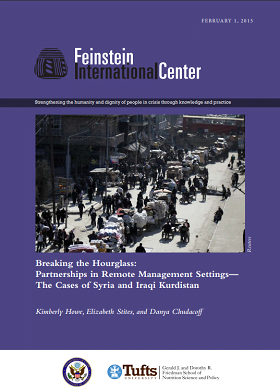
Breaking the Hourglass: Partnerships in Remote Management Settings – The Cases of Syria and Iraqi Kurdistan
Report
This study set out to examine partnerships between international and local organizations engaging in humanitarian action in remote management and insecure settings. The study was motivated by the lack of systematic research in areas where international organizations have limited access due to insecurity...
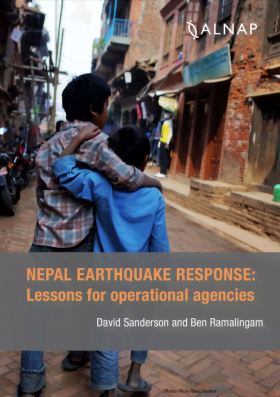
Nepal Earthquake Response: Lessons for operational agencies
Policy paper
In the aftermath of the April 2015 earthquake in Nepal, this paper looks at lessons drawn from previous comparable disasters and seeks to provide invaluable information and assistance to the operational agencies responding to the crisis. Seventeen Lessons give an overview of important learnings based on...
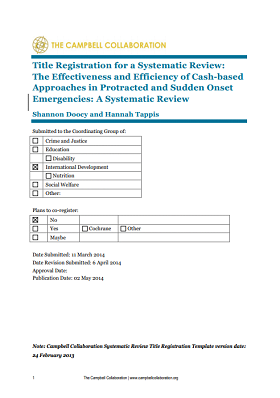
The Effectiveness and Efficiency of Cash-based Approaches in Emergencies: A Systematic Review (Background and Objectives)
Report
This document provides the background, literature review, and objects of the review itself, which is available here. Cash-based approaches have been used for development purposes for a number of decades, particularly within social protection interventions in low- and middle-income countries. Over the...
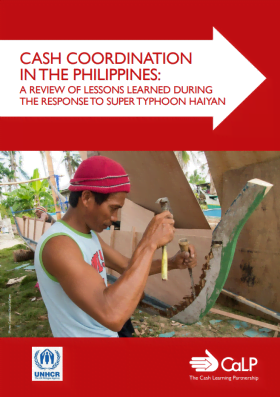
Cash Coordination in the Philippines: A review of lessons learned during the response to Super Typhoon Haiyan
Report
In the last five years there has been a growing trend towards the use of cash transfer programming (CTP) as a response modality in emergencies across the humanitarian sector. The fungibility of cash, when provided without restrictions, offers increased choice for affected populations to...

A Review of Evidence of Humanitarian Cash Transfer Programming in Urban Areas
Report
Urban poor populations frequently experience disasters of varying typology and intensity. When set against a backdrop of poverty and marginalisation, their needs can be complex. As recent urban crises have pushed humanitarian agencies to respond in urban areas, this literature review examines the...

Lessons Learned for Nepal Earthquake Response
Report
The aim of this product is to improve the performance of humanitarian actors in the response of the Nepal earthquake, assist agencies working in the response and encourage positive action by decision makers. The lessons learned, stated in this document, have been a product of the analysis of main findings...

State of the Use of Mobile Technologies for Disaster Preparedness in South East Asia
Report
This report summarizes the study conducted by Nanyang Technology University (NTU) in collaboration with the Global Disaster Preparedness Center with support from the USAID-Office of Foreign Disaster Assistance to better understand how new communication and information sharing technologies can enhance risk...

The Impact of Cash Transfer Programmes on Protection Outcomes in Afghanistan
Report
Although cash-based interventions (CBIs) are increasingly used to deliver humanitarian assistance in support of more traditional in-kind emergency distributions, there is now a growing, global acceptance among stakeholders of the need to pay closer attention to the positive and negative impact of CBIs on...

The Road to Recovery Cash Transfers as an Emergency Response to Nepal’s Earthquake of 2015 and a Catalyst for Consolidating Nepal’s Social Protection Floor
Report
On 27 May, the Nepal Ministry of Finance issued a decision: “Approval of top up cash transfer for early recovery for vulnerable population affected by the Earthquake”. This marks the beginning of a crucial intervention. Proposed interventions: This paper outlines a proposal to address the economic...
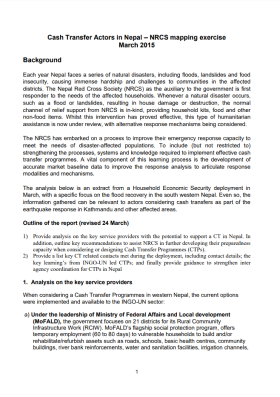
Cash Transfer Actors in Nepal – NRCS Mapping Exercise
Report
Each year Nepal faces a series of natural disasters, including floods, landslides and food insecurity, causing immense hardship and challenges to communities in the affected districts. The Nepal Red Cross Society (NRCS) as the auxiliary to the government is first responder to the needs of the affected...

Documentation and Learning: Rapid emergency assistance to Typhoon Ruby (Hagupit) affected communities in the province of Samar, Philippines April 2015
Report
The documentation and learning study identifies good practices and lessons from the implementation of the Rapid Emergency Assistance to Typhoon Ruby (Hagupit) Affected Communities in the Province of Samar by Christian Aid (CA) and its local NGO partners – Coastal Core Incorporated (CCI), Center for...

Value for Money of Cash Transfers in Emergencies
Report
The objective of this study is to analyse evidence on the Value for Money (VfM) of cash transfers. The study reviews evidence on the economy, efficiency and effectiveness of cash, vouchers and in-kind transfers, in order to support a more structured analysis of the VfM of different transfers. It is based...
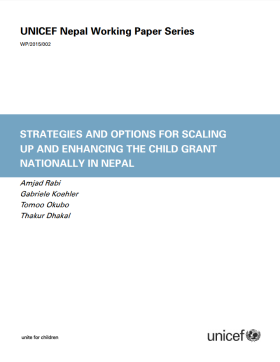
Strategies and Options for Scaling Up and Enhancing the Child Grant Nationally in Nepal
Policy paper
The objective of this study is to offer to the Government of Nepal (GoN) a set of reflections and options regarding the continuation, scale-up and enhancement of the Child Grant (CG), a cash transfer program for children under the age of 5 introduced by the GoN in 2009. While the original intention was to...
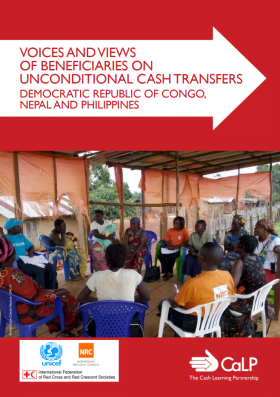
Voices and Views of Beneficiaries on Unconditional Cash Transfers – Democratic Republic of Congo, Nepal and the Philippines
Report
Providing cash in humanitarian emergencies is expanding and the topic is well under discussion within the humanitarian sector with topics ranging from high-level consideration of cash as a tool to transform humanitarian aid, the significance of cash as a way to support beneficiary choice and dignity...
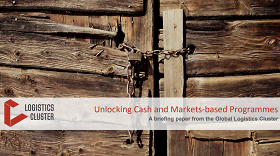
Unlocking Cash and Markets-Based Programmes
Report
In the aftermath of an emergency, humanitarian agencies are increasingly recognising the value of cash and voucher modalities, and market engagement. For Logistics and Supply Chain, our roles are evolving to embrace this trend, adapting our ways of working and even take on new responsibilities. Many...

Household Cash Transfer Assessment – Typhoon Haiyan Recovery Response
Report
An estimated 16.1 million people were affected by typhoon Haiyan, with 1.1 million damaged or destroyed homes and as many as 4.1 million people displaced – nearly four times as many as those left homeless by the 2004 Indian Ocean tsunami. At least 6,300 people lost their lives and another 5.9...
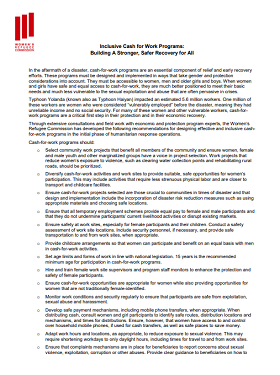
Inclusive Cash for Work Programs: Building A Stronger, Safer Recovery for All
Report
In the aftermath of a disaster, cash-for-work programs are an essential component of relief and early recovery efforts. These programs must be designed and implemented in ways that take gender and protection considerations into account. They must be accessible to women, men and older girls and boys. When...

Markets in Crises: The 2010 Floods in Sindth, Pakistan
Case Study
Floods in Pakistan in 2010 inundated a wide swath of territory, affecting 18 million people and killing approximately 2,000. The disaster also affected businesses, from some of the largest factories and most fertile agricultural land in the country to small village shops. Many businesses closed, either...





